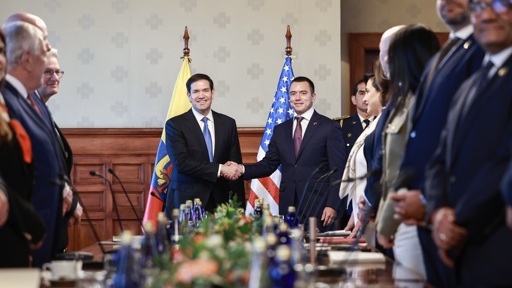On September 4, US Secretary of State Marco Rubio held important meetings with Ecuadorian authorities, including the country’s right-wing president, Daniel Noboa, who has positioned himself as one of the most loyal supporters of the Trump administration’s foreign policy in Latin America.
Rubio, who had previously stopped in Mexico, where he met with President Claudia Sheinbaum, sought to secure a joint agenda between Quito and Washington on security, intelligence, and irregular migration. In this regard, the meeting addressed issues such as drug trafficking, trade relations, and military agreements.
Declaration of Ecuadorian gangs as terrorist groups
While the meeting was taking place, Washington announced that, from that moment on, the Ecuadorian criminal groups Los Choneros and Los Lobos would be considered foreign terrorist organizations. Both groups are considered the most powerful criminal organizations in Ecuador.
On X, Rubio stated: “Productive meeting with President Daniel Noboa in Ecuador. I announced US designation of Los Choneros and Los Lobos as Foreign Terrorist Organizations. This measure strengthens our regional security and reinforces that terrorism has no place in our hemisphere.”
This decision comes amid growing tension in the Caribbean Sea, where the Pentagon has deployed thousands of troops to, they say, confront drug cartels. According to Washington, Venezuelan President Nicolás Maduro belongs to the alleged Cartel de los Soles (Cartel of the Suns), which has been categorically denied by Chavistas, which is why the US military presence in the Caribbean has been interpreted by many experts as a move to pressure Caracas into a change of government.
Under this premise, a few days ago, Trump announced the destruction of a boat that was allegedly transporting drugs; 11 people were killed in the attack. This means that Washington could potentially order unilateral attacks against Los Choneros and Los Lobos.
Noboa, who had sought to have the Trump administration take this action, welcomed Washington’s decision: “Los Choneros and Los Lobos may continue to believe that no one can touch them. But the reality is different: they have been declared terrorist groups by the United States, and with your support, we will remain steadfast in our fight to recover our country.”
In 2024, Noboa declared an internal armed conflict in the country in order to better address the rampant violence that had been unleashed in the country. However, his efforts do not seem to have yielded the desired results. On the contrary, 2025 is the most violent year in Ecuador’s history, positioning the Andean country as the most violent in Latin America. With Washington’s decision, Noboa seeks to breathe new life into a security plan that, to date, has failed to deliver the promised results.
US military bases in Ecuador
On two occasions, the United States has established military bases on Ecuadorian territory. The first instance was during World War II, when the United States established a strategic military base in the Galapagos Islands during its conflict with Japan for control of the Pacific. The second time was between 1999 and 2009, when neoliberal governments agreed to the presence of US troops in Manta. The progressive government of Rafael Correa (2007-2017) decided not to renew the agreement, and the 2008 Constitution prohibited the establishment of foreign military bases in the country.
However, post-Correa governments have made overtures to Washington that point to a possible reestablishment of US military bases in the country. Former presidents Lenín Moreno (2017-2021) and Guillermo Lasso (2021-2023) signed several agreements with Washington, including information exchange and military advisory agreements, as well as agreements for the provision of funds and equipment by the United States. But it is Daniel Noboa who has made the most progress in this regard.
In recent months, the Noboa administration authorized the presence of military ships in the Galapagos Islands, and a few weeks ago announced its intention to reform the constitution to allow foreign troops to be stationed in the country, which will likely be put to a referendum in 2025.
At a press conference at the Carondelet Palace, Rubio said: “We discussed the possibility of stationing US military personnel in the country, in cooperation, obviously with the government, to address a common threat… If they invite us to return, it is a very strategic location; we will study it to see if it makes sense.”
The Secretary of State took the opportunity to accuse former President Correa of collaborating with drug trafficking groups, which is why, allegedly, he did not renew the Manta Base agreement: “We were already here. Correa asked us to leave in 2009. I don’t think he liked us very much, and he wanted to help the drug traffickers.” Rubio also announced that the United States will provide Ecuador with USD 13.5 million for security and an additional USD 6 million for drones. He also announced the possibility of US military personnel training Ecuadorian troops.
Arrival of migrants deported from the United States
In recent days, Ecuador’s Minister of Foreign Affairs, Gabriela Sommerfeld, reported that it is very likely that Ecuador will receive migrants deported from the United States.
“[Receiving migrants is] important for our partner, and we will do so in a coordinated manner, protecting the interests of the Ecuadorian state and with Ecuador’s right to veto individuals who are not in our interest,” Sommerfeld said when asked by the press about the potential arrival of detained migrants from third countries coming from the United States.
Ecuador would thus join other Latin American countries that receive migrants from the United States who come from third countries, such as El Salvador and Guatemala.
The post Noboa opens door to US military bases, backs Rubio’s FTO designation for Ecuadorian gangs appeared first on Peoples Dispatch.
From Peoples Dispatch via this RSS feed


